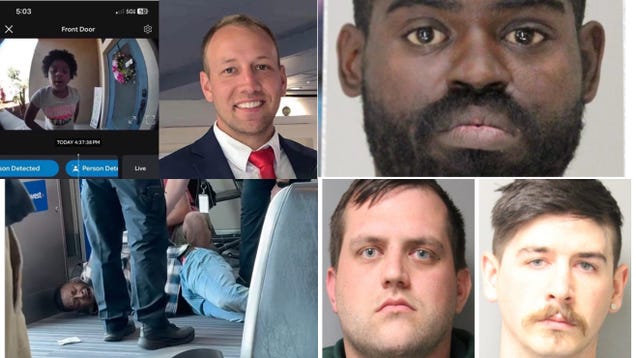The holidays are a time of return for so many of us. It’s that time of year when we go back to the people and places that have shaped us. Many will be confronted with the normal anxieties that returning home (either the ones we were born into or have chosen) can bring, but it is far higher for those of us who identify as trans.
One of the places which I call home is Salvador da Bahia in Brazil. Just last week I returned from my first trip there in six years. Between 2013 and now, I transitioned. I was nervous about returning and didn’t know what to expect. But it turns out that my trepidation was totally unwarranted.
It turns out that my womanhood was affirmed there in ways unmatched by any other place I have ever visited. This fact affirmed for me a simple truth: sometimes going home means finding acceptance.
READ MORE: Body of transgender woman Bee Love Slater found burned beyond recognition in Florida
Though I was not born in Brazil, I have been to Salvador more times than I can remember since my first visit in 2003. Nestled on bluff in a region that is the closest point in the Americas to Africa, Salvador is the capital of Afro-Brazil. And since Brazil was the single largest destination for enslaved people from Africa, Salvador is one of the most important cities in the entire African diaspora. Understandably, AfroPunk just announced dates for the latest franchise of its music festival there.
Aided by my fluency in Portuguese, the richness of Blackness in Bahia has molded me culturally and spiritually. It affirmed my deep and abiding connection to other Black people from around the world who had always been there but were not as tangible until I set foot in Salvador. It got me to see the Africaness of the foods I ate growing up in Atlanta, the rhythms of the music I listened to, and even the side-eye glances intrinsic of my great grandmother. Protected by its shores, it literally served as my actual home in 2009 as I rode out the worst of the financial crisis in the States. It also opened my eyes to the African spiritual practices grounded in Orixas, which ties the spiritual world with the real one and form the basis of modern-day Afro-Christianity in the U.S.
So, with all of these gifts, why did I have so much trepi

dation about returning?
I realized that since my last trip, I had changed. Assigned a male gender at birth, I transitioned to become the woman that I was always meant to be. And despite its openness, Brazil can be a harsh place for trans women. The country actually has the highest number of trans murders in the world, followed by Mexico and the United States. Just this week a Brazilian man was arrested for shooting and choking Marcelle Brandina, a trans woman, to death. My nervousness was not a figment of my imagination but grounded in observable realities.
READ MORE: Sade’s transgender son opens up about “trying, tiring, painful” process of sex reassignment surgery
And yet, my actual experience in Salvador was totally different than these facts would suggest.
In existing in and moving about within the city, I felt totally free in my Blackness and in my womanhood. Not once while entering a cab, going into a shop, drinking at the club, or resting by the beach was I misgendered. Not one time. The only other place that has ever come close to mirroring this experience for me, one that all people are entitled to, is my native Atlanta.
It got me thinking, what do Salvador and Atlanta have in common? I realized that both places are where Blackness is centered and consequently the importance of Black womanhood.
The idea of Black womanhood, not only emphasizes our beauty and role as nurturers, but also our power and fulsomeness. In Salvador, the cultural ideal of a Black woman is captured in the word “negona.” A negona’s strength and desirability comes from her dark skin, full lips, thick hips, and broad facial features. She is attractive because of what she has versus what she does not.
READ MORE: FIRST LOOK: RuPaul is Ruby Red in Netflix’s ‘AJ and the Queen’
This contrasts with traditional ideas of White womanhood which, through the beauty industry and mass media, became the global idea of womanhood overall. White womanhood emphasizes fragility, smallness, and deference —the very lack of agency— to support patriarchy.

Therefore in Salvador, and other cities like it, where there is cultural space for Black womanhood, my femininity is accepted, embraced and celebrated. This is how Salvador gave me peace and freedom to be who I am as a Black trans woman.
READ MORE: White woman accuses Black playwright of racism after viewing ‘Slave Play’
As I gather together over the next few weeks with friends and family, my hope for the world is that more places will give the gift of opening spaces for ourselves so that we can open spaces for others. Against the backdrop of reinvigorated white supremacy, it’s the only way to move forward into this new decade.
Imara Jones is the creator of “TransLash,” a four-part web docu-series about what it is like to be a trans woman of color at a time of social backlash. She is a Fellow-in-Residence at The New York Women’s Foundation and is on the board of the Anti-Violence Project.
The post OPINION: How Salvador da Bahia liberated this Black trans woman appeared first on theGrio.
from theGrio https://ift.tt/2rKpvgR


